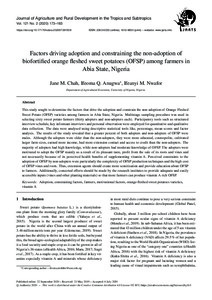Datum
2020-09-22Metadata
Zur Langanzeige
Aufsatz

Factors driving adoption and constraining the non-adoption of biofortified orange fleshed sweet potatoes (OFSP) among farmers in Abia State, Nigeria
Zusammenfassung
This study sought to determine the factors that drive the adoption and constrain the non-adoption of Orange Fleshed Sweet Potato (OFSP) varieties among farmers in Abia State, Nigeria. Multistage sampling procedure was used in selecting sixty sweet potato farmers (thirty adopters and non-adopters each). Participatory tools such as structured interview schedule, key informant interviews and personal observation were employed for quantitative and qualitative data collection. The data were analysed using descriptive statistical tools like, percentage, mean scores and factor analysis. The results of the study revealed that a greater percent of both adopters and non-adopters of OFSP were males. Although the adopters were older than the non-adopters, they were more educated, cosmopolite, cultivated larger farm sizes, earned more income, had more extension contact and access to credit than the non-adopters. The majority of adopters had high knowledge, while non-adopters had moderate knowledge of OFSP. The adopters were motivated to adopt the OFSP mainly as a result of its pleasant taste, profit from the sale of its roots and vines and not necessarily because of its perceived health benefits of supplementing vitamin A. Perceived constraints to the adoption of OFSP by non-adopters were particularly the complexity of OFSP production techniques and the high cost of OFSP vines and roots. Thus, extension agents should create more sensitisation and provide education about OFSP to farmers. Additionally, concerted eorts should be made by the research institutes to provide adequate and easily accessible inputs (vines and other planting materials) so that more farmers can produce vitamin A rich OFSP.
Zitierform
In: Journal of Agriculture and Rural Development in the Tropics and Subtropics (JARTS) Vol. 121 / No. 2 (2020-09-22) , S. 173-183 ; EISSN 2363-6033Sammlung(en)
Vol 121, No 2 (2020) (Journal of Agriculture and Rural Development in the Tropics and Subtropics (JARTS))Zitieren
@article{doi:10.17170/kobra-202007291509,
author={Chah, Jane M. and Anugwa, Ifeoma Quinette and Nwafor, Ifeanyi M.},
title={Factors driving adoption and constraining the non-adoption of biofortified orange fleshed sweet potatoes (OFSP) among farmers in Abia State, Nigeria},
journal={Journal of Agriculture and Rural Development in the Tropics and Subtropics (JARTS)},
year={2020}
}
0500 Oax
0501 Text $btxt$2rdacontent
0502 Computermedien $bc$2rdacarrier
1100 2020$n2020
1500 1/eng
2050 ##0##http://hdl.handle.net/123456789/11846
3000 Chah, Jane M.
3010 Anugwa, Ifeoma Quinette
3010 Nwafor, Ifeanyi M.
4000 Factors driving adoption and constraining the non-adoption of biofortified orange fleshed sweet potatoes (OFSP) among farmers in Abia State, Nigeria / Chah, Jane M.
4030
4060 Online-Ressource
4085 ##0##=u http://nbn-resolving.de/http://hdl.handle.net/123456789/11846=x R
4204 \$dAufsatz
4170
5550 {{Abia}}
5550 {{Batate}}
5550 {{Landwirt}}
5550 {{Vitamin-A-Gruppe}}
7136 ##0##http://hdl.handle.net/123456789/11846
<resource xsi:schemaLocation="http://datacite.org/schema/kernel-2.2 http://schema.datacite.org/meta/kernel-2.2/metadata.xsd"> 2020-10-02T13:07:50Z 2020-10-02T13:07:50Z 2020-09-22 doi:10.17170/kobra-202007291509 http://hdl.handle.net/123456789/11846 eng Namensnennung 4.0 International http://creativecommons.org/licenses/by/4.0/ adoption constraining factors farmers motivational factors orange-fleshed sweet potatoes varieties vitamin A 630 Factors driving adoption and constraining the non-adoption of biofortified orange fleshed sweet potatoes (OFSP) among farmers in Abia State, Nigeria Aufsatz This study sought to determine the factors that drive the adoption and constrain the non-adoption of Orange Fleshed Sweet Potato (OFSP) varieties among farmers in Abia State, Nigeria. Multistage sampling procedure was used in selecting sixty sweet potato farmers (thirty adopters and non-adopters each). Participatory tools such as structured interview schedule, key informant interviews and personal observation were employed for quantitative and qualitative data collection. The data were analysed using descriptive statistical tools like, percentage, mean scores and factor analysis. The results of the study revealed that a greater percent of both adopters and non-adopters of OFSP were males. Although the adopters were older than the non-adopters, they were more educated, cosmopolite, cultivated larger farm sizes, earned more income, had more extension contact and access to credit than the non-adopters. The majority of adopters had high knowledge, while non-adopters had moderate knowledge of OFSP. The adopters were motivated to adopt the OFSP mainly as a result of its pleasant taste, profit from the sale of its roots and vines and not necessarily because of its perceived health benefits of supplementing vitamin A. Perceived constraints to the adoption of OFSP by non-adopters were particularly the complexity of OFSP production techniques and the high cost of OFSP vines and roots. Thus, extension agents should create more sensitisation and provide education about OFSP to farmers. Additionally, concerted eorts should be made by the research institutes to provide adequate and easily accessible inputs (vines and other planting materials) so that more farmers can produce vitamin A rich OFSP. open access Chah, Jane M. Anugwa, Ifeoma Quinette Nwafor, Ifeanyi M. Abia Batate Landwirt Vitamin-A-Gruppe publishedVersion EISSN 2363-6033 No. 2 Journal of Agriculture and Rural Development in the Tropics and Subtropics (JARTS) 173-183 Vol. 121 false </resource>
Die folgenden Lizenzbestimmungen sind mit dieser Ressource verbunden:


